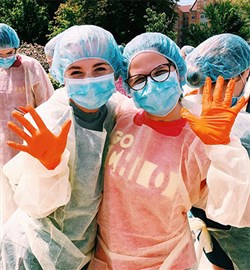VOL. 44 | NO. 21 | Friday, May 22, 2020
New St. Thomas nurses graduate to changed world
By Kylie Hubbard

Courtney Osborne, right, with friend Caroline Billions on their first day of nursing school at UT.
-- Photograph ProvidedCourtney Osborne joined the University of Tennessee nursing program after spending time at the bedside of her grandmother, who was diagnosed with Stage IV cancer in 2014.
She saw that being a nurse wasn’t just about medication and treatment.
“Nurses are compassionate people who lend a helping hand or a listening ear to others in their most vulnerable moments,” Osborne says. “I chose nursing because I wanted to dedicate my life to a career with true purpose.”
Today, she is a UT nursing graduate who will soon begin her residency at Saint Thomas Midtown in Nashville. Her chosen career is under a global spotlight with nurses on the front lines of the COVID-19 pandemic. Nurses and other health care workers are being asked to work long hours, sometimes without proper protective gear, and even risk death from the virus to do their job.
“I am so excited to finally step into the clinical environment with the letters ‘RN’ on my badge,” Osborne adds. “Although it will look a little different with the global pandemic going on in the world today, my excitement overrides my anxiety.”
As UT students transitioned to virtual learning in mid-March, the College of Nursing worked to find the best solution for its students, who spend a majority of their time learning in hands-on environments.
One of the toughest changes was clinical hours, which are required in order to graduate from the program. Clinicals, which are on-site rotations at various medical institutions such as UT Medical Center, give students the chance to take skills learning in labs and classrooms and apply it to actual patients while monitored by a nurse preceptor who oversees training. Also called a preceptorship, clinicals can be equated to an internship in other fields of study.
Nursing students of senior standing were given the option to remain with their assigned preceptorship or transition to a new virtual reality through online simulations.
“If this had been five or 10 years ago, it would have been a huge problem,” says Shelia Swift, associate dean of the UT College of Nursing says. “Fortunately with technology and the products that are available, it is at least was doable.”
The Tennessee Board of Nursing regulates the number of clinical hours needed for a graduating nursing student, and Swift says they made sure students wouldn’t miss much-needed instruction.
Swift adds that the virtual shift hasn’t affected the future for UT’s nursing students since the department hasn’t received any word of canceled or delayed residencies for graduating nurses. She predicts once each student takes and passes the National Council Licensure Examination (NCLEX) over the summer, each will start a successful career.
“Fortunately, it was toward the end of the semester, so most of the content had been covered,” Swift says of the impact of the pandemic on UT’s nursing students.
It’s unclear how COVID-19 will affect the NCLEX, although some states have altered the test requirement in order to get more nursing students into much needed positions such as nurse midwives, neonatal nurses and acute care nurse practitioners. The state is working with Pearson VUE, the NCLEX testing vendor, to ensure the safety of the NCLEX testing candidates.
‘Forever be changed’
Following the NCLEX exam, Osborne and fellow UT four-year program graduate Hannah Emery both plan to start their residency at Saint Thomas Midtown in Nashville.

“I am also a little anxious for the real world, especially with the pandemic,” Emery admits.
-- Photograph ProvidedBoth will enter their residencies as registered nurses, which can range from work in hospitals and schools to assisted living facilities and households. RNs often prepare patients before visiting a doctor, surgeon or physician and can administer medication, inform families and patients, and provide additional care.
Emery shares Osborne’s sentiments about her profession, reflecting on the pride she has in her graduating class for overcoming the current situation to graduate and move on to their calling.
“I am also a little anxious for the real world, especially with the pandemic,” Emery acknowledges. “However, I know that this will be a learning experience and a way for me to show compassion when it is most needed in the world.”
While Osborne chose to move her preceptorship at the UT Medical Center NICU, Emery chose to remain with her preceptor at the mother and baby unit at the medical center. Required to wear a mask and stay removed from COVID-19-suspected patients, Emery says what you put into college is what you’ll get out of it, and is something all current nursing students should keep in mind.
Rising UT nursing senior Maeve Mulligan was required as a junior-level student to stop her clinical hours in favor of a virtual simulation environment. Mulligan says she is nervous heading into her senior year because she has missed clinical time and struggled to keep up in the online setting.
“I am slightly nervous because health care is rapidly evolving through this pandemic,” Mulligan says. “What I expected my career as a nurse to look like prior to this pandemic will forever be changed due to the health practices that changed from this virus.”
Mulligan adds she is choosing to maintain positivity, even though she is unsure of the promise by the nursing school to cover some missed topics the week before classes start in the fall. She adds that freshmen considering the major should continue to follow their passion because health care is of importance right now.
“When choosing this career path, I knew that I was going to have to be flexible and that health care would be forever changing,” Mulligan says. “These changes are just something that comes with the career of being a nurse.”
Recruitment unclear
With a successful graduating class comes the hopes of a promising incoming first-year class. Swift says the impact of the COVID-19 on the incoming class probably won’t be seen until the end of summer, as more is known about the virus. Swift adds that the biggest deterrent from students attending or returning could be parental advice against it.
“From seeing the reaction that some parents had even to our junior and senior students, I would be surprised if there are out-of-state recruits that end up staying closer to home,” Swift says, who says she hopes for a strong freshman class and for those who are obtaining their successful academic career to be able to access the limited clinical spots available in upper-division nursing courses.
Dean of the Vanderbilt University College of Nursing Linda Norman shares the same sentiment, relating what might happen in the aftermath of COVID-19 to that of the 2008 economic recession. Norman says many turned to nursing as a career choice because the field seemed steady. On average, an entry-level nurse earns an annual salary of $61,728.
“One of the things I wonder is (how) ‘news of nurses are your heroes’ will change (things),” Norman says. “They’re really seeing the value of nursing.”
Vanderbilt doesn’t offer an undergraduate nursing degree program and instead offers advanced practice degrees for nurses to improve their skills learned as undergraduates. In addition, the program offers a course track for those that completed a bachelor’s degree outside of nursing but wish to become a nurse. Norman notes she believes this track could see an uptick in the wake of COVID-19.
“There are two pieces of it: One is nurses making a huge contribution to patient care and it’s a great profession, but there’s been a lot of portrayal of the stress of the pandemic,” Norman concedes.
Both Norman and Swift agree money will be a determining factor for recruitment and retaining students. Some students or their parents will likely face economic instability due to COVID-19, and might wish to postpone the start of their collegiate careers.
A four-year degree from UT costs on average $63,472 for in-state students and $137,152 for out-of-state students, including course and program fees. At the Vanderbilt nursing school is a $1,642 per credit hour tuition rate, with additional fees added depending on the student and program choice.
UT has announced it plans to host courses on campus for the fall 2019, and Vanderbilt has not yet announced its plan to return to campus in the fall, although staff members will return in phases.